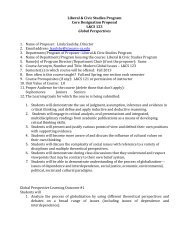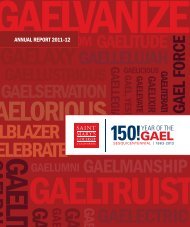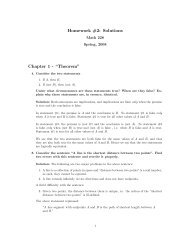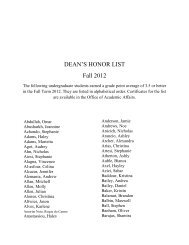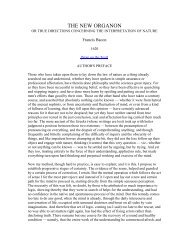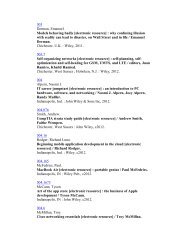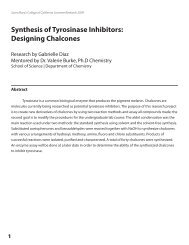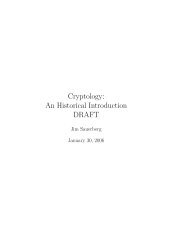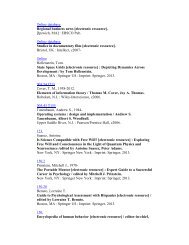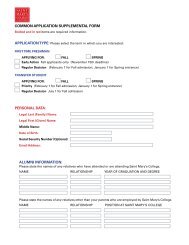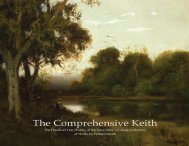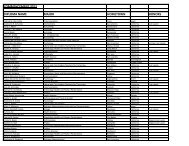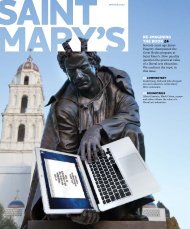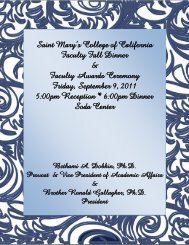2008-09 Catalog - Saint Mary's College of California
2008-09 Catalog - Saint Mary's College of California
2008-09 Catalog - Saint Mary's College of California
You also want an ePaper? Increase the reach of your titles
YUMPU automatically turns print PDFs into web optimized ePapers that Google loves.
Modern Languages Curriculum2 Continuing Elementary SpanishFor students with one or two years <strong>of</strong> secondary study <strong>of</strong> Spanish (orthe equivalent). This course continues the development <strong>of</strong> reading, writing,listening, and speaking, emphasizing conversation on everyday topics.Prerequisite: Spanish 1 or equivalent.*Does not satisfy an Area requirement unless language requirement hasalready been satisfied.3 Intermediate SpanishFor students with two or three years <strong>of</strong> secondary study <strong>of</strong> Spanish (orthe equivalent). This course continues the development <strong>of</strong> reading, writing,listening and speaking, fostering confidence in conversation and compositionacross a variety <strong>of</strong> subjects. Prerequisite: Spanish 2 or equivalent.*Does not satisfy an Area requirement unless language requirement hasalready been satisfied.4 Continuing Intermediate SpanishFor students with three or four years <strong>of</strong> secondary study <strong>of</strong> Spanish(or the equivalent). This course <strong>of</strong>fers an abbreviated review <strong>of</strong> primarystructures and concentrates heavily on developing communicative abilitythrough readings, music and visual resources. For students who havecompleted an overview <strong>of</strong> basic grammar and are ready to combineand apply their language skills in most settings. Prerequisite: Spanish 3or equivalent.6 Conversation (.25)Conversational practice for students enrolled in first- or second-yearSpanish. Meets once a week. May be repeated for credit.*Does not satisfy an Area requirement.9 Spanish for Spanish SpeakersA course designed specifically for Latino students who wish to improvetheir written language. Differences between written and spoken Spanishare emphasized. Reading and discussion <strong>of</strong> essays and short stories byLatino and Latin American writers; regular written assignments.10 Conversation-CompositionThis course prepares students for upper-division work by developingfluency in speaking and writing. Curriculum includes study and discussion<strong>of</strong> selected texts by contemporary Spanish authors, with emphasis on theshort story; discussion and debate <strong>of</strong> contemporary issues; written composition.A sound knowledge <strong>of</strong> Spanish grammar is expected althoughparticular features <strong>of</strong> the language are reviewed. Required for Spanishmajors. Also open to students from other disciplines who wish to improvetheir mastery <strong>of</strong> the language. Prerequisite: Spanish 4 or the equivalent.11 Introduction to LiteratureIntroduction to literary analysis. This course requires close reading <strong>of</strong>texts and emphasizes extensive writing about literature. Examination <strong>of</strong>the notion <strong>of</strong> genre, narrative devices, structure, etc. Required <strong>of</strong> majorsand minors. Prerequisite: Spanish 9 or 10, or the equivalent.21 Intensive Elementary SpanishAn accelerated review <strong>of</strong> first-year college Spanish for students withsome prior study <strong>of</strong> the language. Satisfactory completion <strong>of</strong> this course(minimum grade C-) gives credit for Spanish 2.Upper DivisionFrench100 Advanced Phonetics and History<strong>of</strong> the French LanguageA survey <strong>of</strong> the evolution <strong>of</strong> the French language, treating phonology,syntax, lexicon and semantics; detailed analysis <strong>of</strong> the sounds and speechpatterns <strong>of</strong> modern French.*Does not satisfy an Area requirement.101–102 Advanced French Syntax and CompositionThis course serves as a systematic review <strong>of</strong> essential aspects <strong>of</strong> Frenchsyntax, with a focus on developing composition skills. Analysis <strong>of</strong>model texts serves as a means to improving self-expression and writtencommunication.103 Advanced Composition and StylisticsUsing literary texts as a point <strong>of</strong> departure, this course concentrateson stylistics in order to help students perfect their own writingstyle in French.104 Workshop in TranslationIntroduction to the linguistic and aesthetic problems <strong>of</strong> translation, withemphasis on learning through practice. Focus on various kinds <strong>of</strong> texts,both literary and technical. Equal emphasis given to translating fromFrench into English (version) and from English into French (theme).106 Conversation on Contemporary Issues (.25)Open to students with at least two years <strong>of</strong> French. Meets once a week.May be repeated for credit.*Does not satisfy an Area requirement.121 French Literature: Middle Agesto the RenaissanceReadings in medieval epic poems (chansons de geste), lyric poetry, andcourtly novel; early religious and secular theater; first historians; majorwriters <strong>of</strong> the Renaissance: Rabelais, Montaigne, Marguerite de Navarre,poets <strong>of</strong> the Pléiade.122 French Literature: Seventeenthand Eighteenth CenturiesStudy <strong>of</strong> the great writers <strong>of</strong> the age <strong>of</strong> Classicism: plays by Corneille,Moliére, and Racine; the fables <strong>of</strong> La Fontaine; the ideas <strong>of</strong> Descartesand Pascal; Mme de Lafayette and the birth <strong>of</strong> the psychological novel;introduction to the great philosophes <strong>of</strong> the Age <strong>of</strong> Enlightenment:Montesquieu, Voltaire, Diderot, Rousseau. The theater <strong>of</strong> Marivaux andBeaumarchais; preromanticism in the novel.123 French Literature: Nineteenthand Twentieth CenturiesThe principal literary movements <strong>of</strong> the 19th-century: romanticismand symbolism in poetry and drama, realism and naturalism in the noveland short story; development <strong>of</strong> the 20th-century novel, from Proust tothe nouveau roman; trends in modern drama, poetry and philosophy.60 Spanish Civilization for Travel Courses (.25)In preparation for study in Spain, students read about major periods inhistory and analyze the principal currents in art. In addition this courseexamines cultural traits <strong>of</strong> everyday life.*Does not satisfy an Area requirement.133



